Importance of Reflective Learning and Feedback in Higher Education
VerifiedAdded on 2023/06/08
|8
|2229
|387
AI Summary
This essay discusses the importance of reflective learning and feedback in higher education. It covers various reflective models and approaches, such as Gibbs reflective cycle, and how they can help students improve their performance. The essay also explores the nature of feedback and feedforward and how they can inform and improve future formative and summative work. The importance of formative and summative assessments is also discussed.
Contribute Materials
Your contribution can guide someone’s learning journey. Share your
documents today.
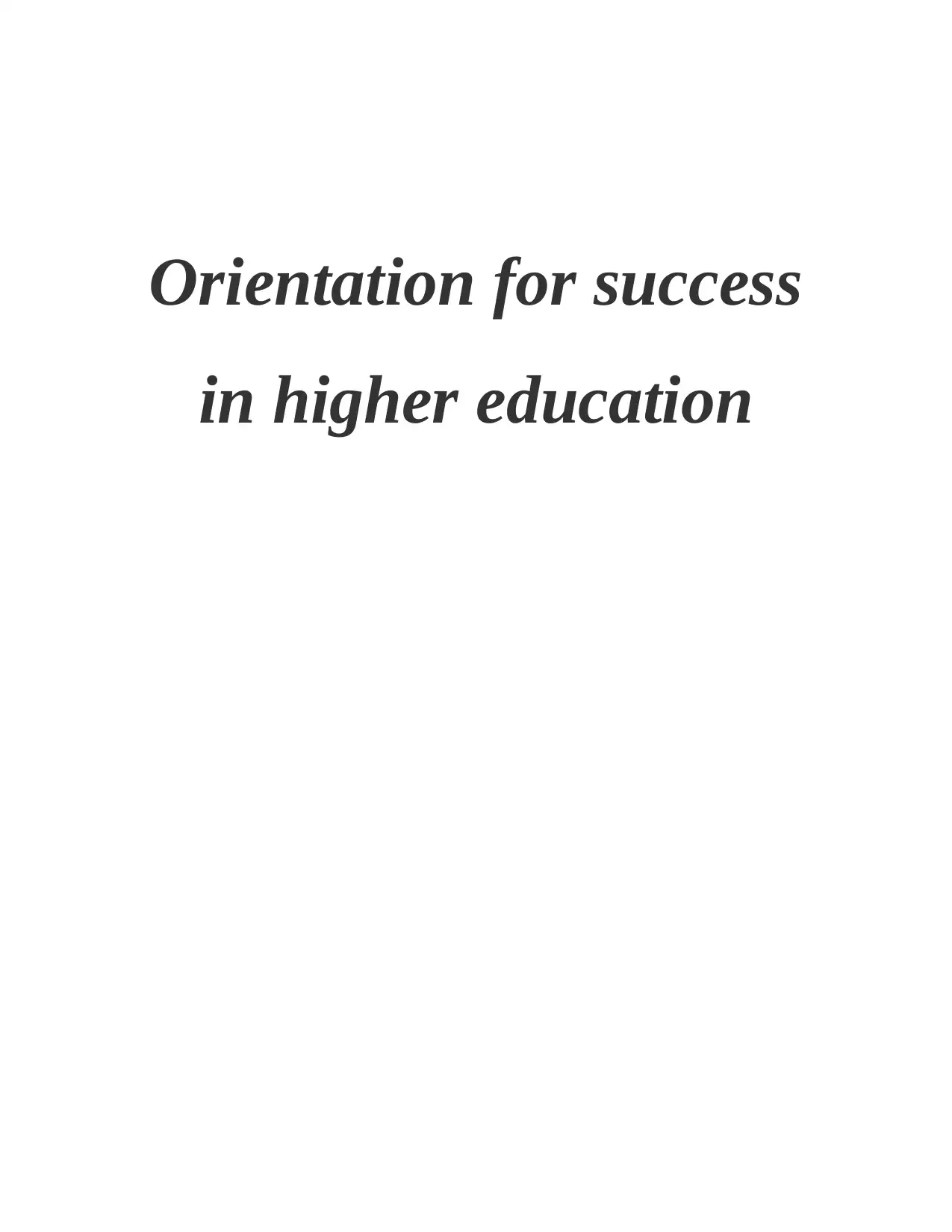
Orientation for success
in higher education
in higher education
Secure Best Marks with AI Grader
Need help grading? Try our AI Grader for instant feedback on your assignments.
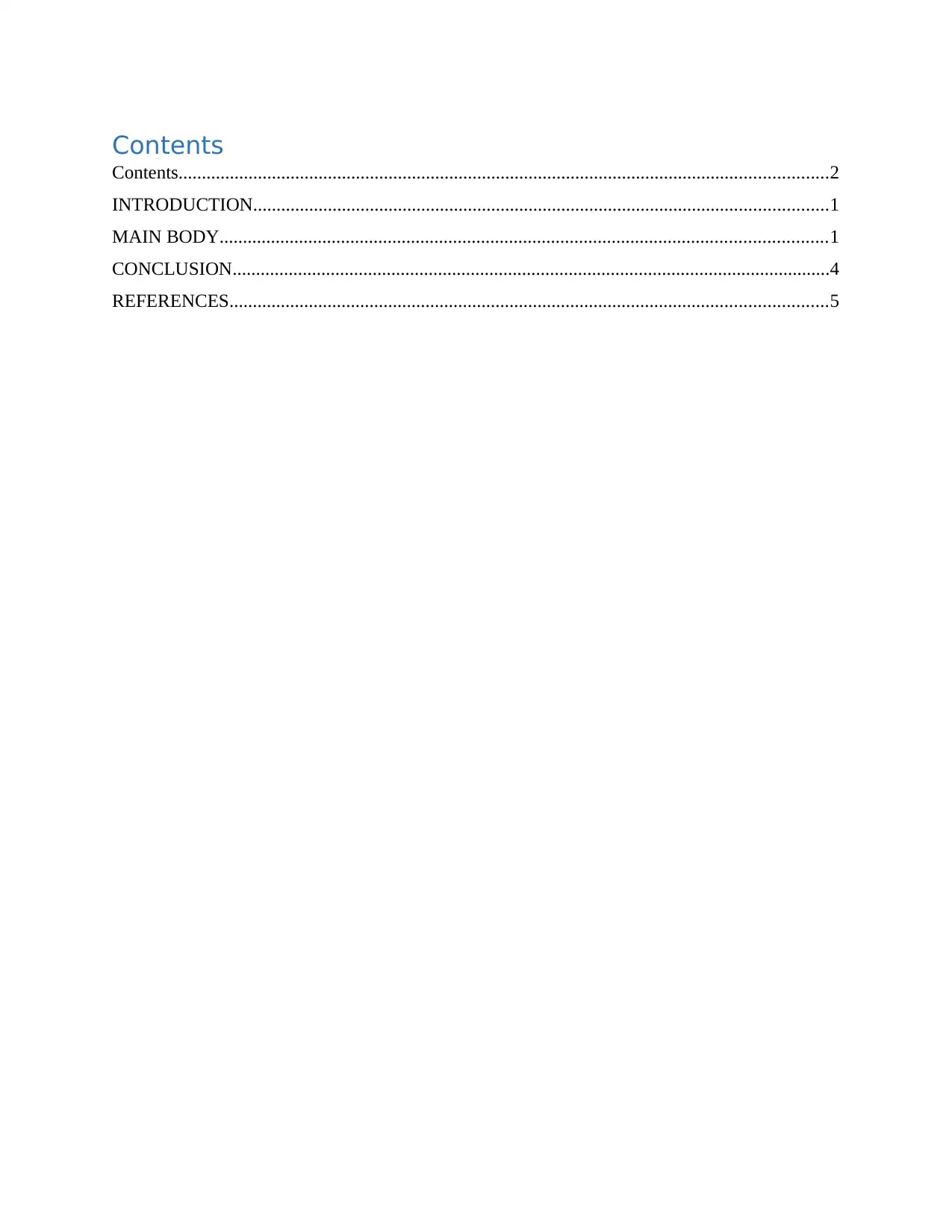
Contents
Contents...........................................................................................................................................2
INTRODUCTION...........................................................................................................................1
MAIN BODY..................................................................................................................................1
CONCLUSION................................................................................................................................4
REFERENCES................................................................................................................................5
Contents...........................................................................................................................................2
INTRODUCTION...........................................................................................................................1
MAIN BODY..................................................................................................................................1
CONCLUSION................................................................................................................................4
REFERENCES................................................................................................................................5
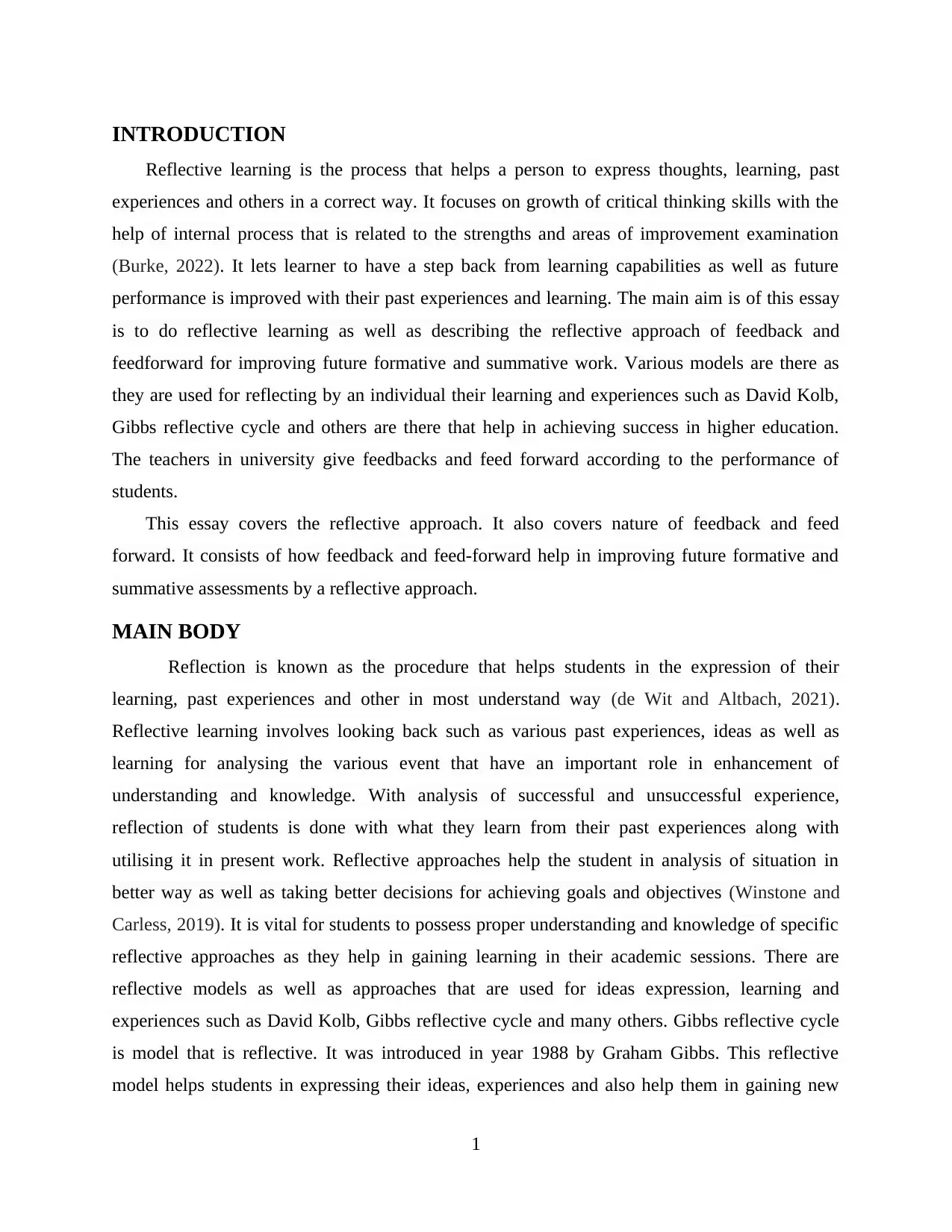
INTRODUCTION
Reflective learning is the process that helps a person to express thoughts, learning, past
experiences and others in a correct way. It focuses on growth of critical thinking skills with the
help of internal process that is related to the strengths and areas of improvement examination
(Burke, 2022). It lets learner to have a step back from learning capabilities as well as future
performance is improved with their past experiences and learning. The main aim is of this essay
is to do reflective learning as well as describing the reflective approach of feedback and
feedforward for improving future formative and summative work. Various models are there as
they are used for reflecting by an individual their learning and experiences such as David Kolb,
Gibbs reflective cycle and others are there that help in achieving success in higher education.
The teachers in university give feedbacks and feed forward according to the performance of
students.
This essay covers the reflective approach. It also covers nature of feedback and feed
forward. It consists of how feedback and feed-forward help in improving future formative and
summative assessments by a reflective approach.
MAIN BODY
Reflection is known as the procedure that helps students in the expression of their
learning, past experiences and other in most understand way (de Wit and Altbach, 2021).
Reflective learning involves looking back such as various past experiences, ideas as well as
learning for analysing the various event that have an important role in enhancement of
understanding and knowledge. With analysis of successful and unsuccessful experience,
reflection of students is done with what they learn from their past experiences along with
utilising it in present work. Reflective approaches help the student in analysis of situation in
better way as well as taking better decisions for achieving goals and objectives (Winstone and
Carless, 2019). It is vital for students to possess proper understanding and knowledge of specific
reflective approaches as they help in gaining learning in their academic sessions. There are
reflective models as well as approaches that are used for ideas expression, learning and
experiences such as David Kolb, Gibbs reflective cycle and many others. Gibbs reflective cycle
is model that is reflective. It was introduced in year 1988 by Graham Gibbs. This reflective
model helps students in expressing their ideas, experiences and also help them in gaining new
1
Reflective learning is the process that helps a person to express thoughts, learning, past
experiences and others in a correct way. It focuses on growth of critical thinking skills with the
help of internal process that is related to the strengths and areas of improvement examination
(Burke, 2022). It lets learner to have a step back from learning capabilities as well as future
performance is improved with their past experiences and learning. The main aim is of this essay
is to do reflective learning as well as describing the reflective approach of feedback and
feedforward for improving future formative and summative work. Various models are there as
they are used for reflecting by an individual their learning and experiences such as David Kolb,
Gibbs reflective cycle and others are there that help in achieving success in higher education.
The teachers in university give feedbacks and feed forward according to the performance of
students.
This essay covers the reflective approach. It also covers nature of feedback and feed
forward. It consists of how feedback and feed-forward help in improving future formative and
summative assessments by a reflective approach.
MAIN BODY
Reflection is known as the procedure that helps students in the expression of their
learning, past experiences and other in most understand way (de Wit and Altbach, 2021).
Reflective learning involves looking back such as various past experiences, ideas as well as
learning for analysing the various event that have an important role in enhancement of
understanding and knowledge. With analysis of successful and unsuccessful experience,
reflection of students is done with what they learn from their past experiences along with
utilising it in present work. Reflective approaches help the student in analysis of situation in
better way as well as taking better decisions for achieving goals and objectives (Winstone and
Carless, 2019). It is vital for students to possess proper understanding and knowledge of specific
reflective approaches as they help in gaining learning in their academic sessions. There are
reflective models as well as approaches that are used for ideas expression, learning and
experiences such as David Kolb, Gibbs reflective cycle and many others. Gibbs reflective cycle
is model that is reflective. It was introduced in year 1988 by Graham Gibbs. This reflective
model helps students in expressing their ideas, experiences and also help them in gaining new
1
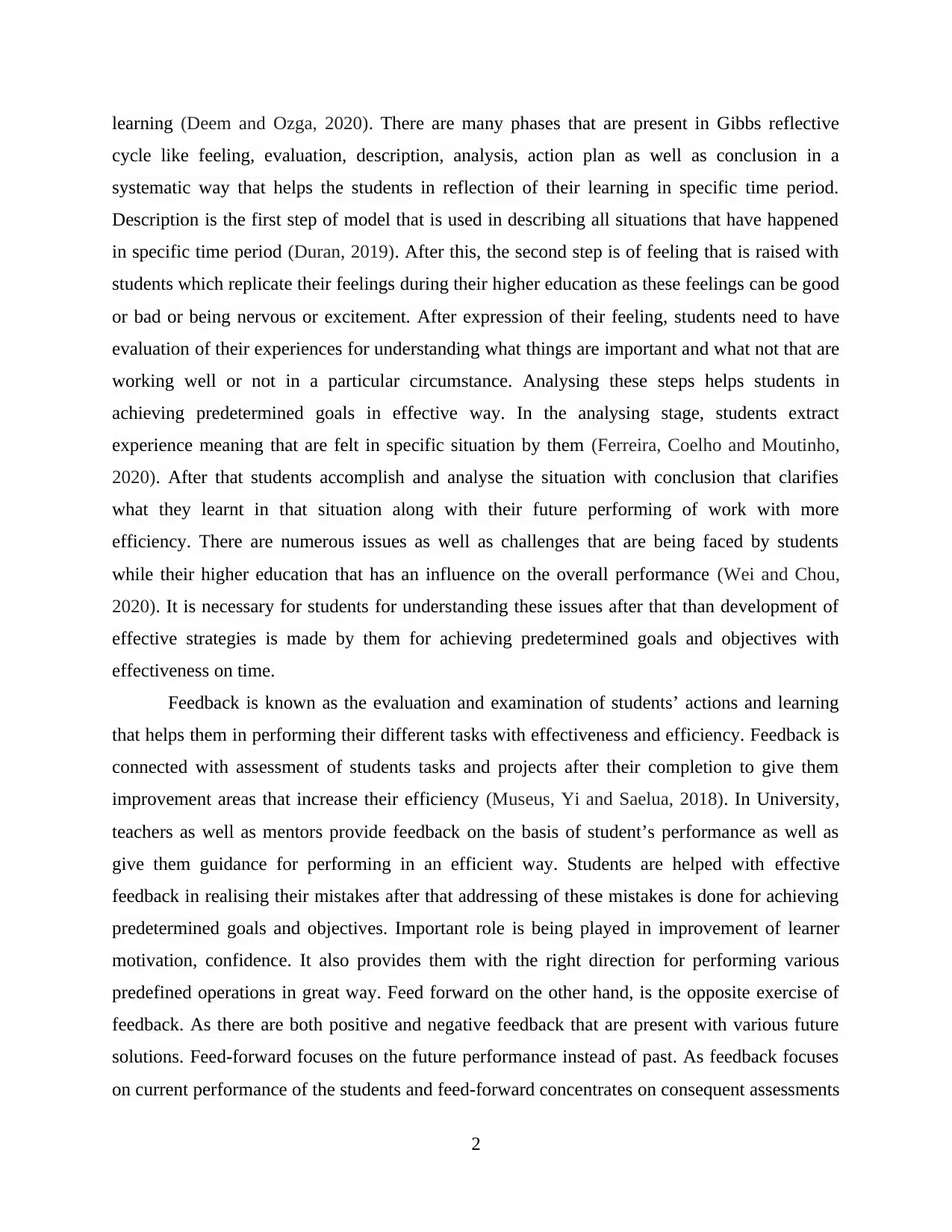
learning (Deem and Ozga, 2020). There are many phases that are present in Gibbs reflective
cycle like feeling, evaluation, description, analysis, action plan as well as conclusion in a
systematic way that helps the students in reflection of their learning in specific time period.
Description is the first step of model that is used in describing all situations that have happened
in specific time period (Duran, 2019). After this, the second step is of feeling that is raised with
students which replicate their feelings during their higher education as these feelings can be good
or bad or being nervous or excitement. After expression of their feeling, students need to have
evaluation of their experiences for understanding what things are important and what not that are
working well or not in a particular circumstance. Analysing these steps helps students in
achieving predetermined goals in effective way. In the analysing stage, students extract
experience meaning that are felt in specific situation by them (Ferreira, Coelho and Moutinho,
2020). After that students accomplish and analyse the situation with conclusion that clarifies
what they learnt in that situation along with their future performing of work with more
efficiency. There are numerous issues as well as challenges that are being faced by students
while their higher education that has an influence on the overall performance (Wei and Chou,
2020). It is necessary for students for understanding these issues after that than development of
effective strategies is made by them for achieving predetermined goals and objectives with
effectiveness on time.
Feedback is known as the evaluation and examination of students’ actions and learning
that helps them in performing their different tasks with effectiveness and efficiency. Feedback is
connected with assessment of students tasks and projects after their completion to give them
improvement areas that increase their efficiency (Museus, Yi and Saelua, 2018). In University,
teachers as well as mentors provide feedback on the basis of student’s performance as well as
give them guidance for performing in an efficient way. Students are helped with effective
feedback in realising their mistakes after that addressing of these mistakes is done for achieving
predetermined goals and objectives. Important role is being played in improvement of learner
motivation, confidence. It also provides them with the right direction for performing various
predefined operations in great way. Feed forward on the other hand, is the opposite exercise of
feedback. As there are both positive and negative feedback that are present with various future
solutions. Feed-forward focuses on the future performance instead of past. As feedback focuses
on current performance of the students and feed-forward concentrates on consequent assessments
2
cycle like feeling, evaluation, description, analysis, action plan as well as conclusion in a
systematic way that helps the students in reflection of their learning in specific time period.
Description is the first step of model that is used in describing all situations that have happened
in specific time period (Duran, 2019). After this, the second step is of feeling that is raised with
students which replicate their feelings during their higher education as these feelings can be good
or bad or being nervous or excitement. After expression of their feeling, students need to have
evaluation of their experiences for understanding what things are important and what not that are
working well or not in a particular circumstance. Analysing these steps helps students in
achieving predetermined goals in effective way. In the analysing stage, students extract
experience meaning that are felt in specific situation by them (Ferreira, Coelho and Moutinho,
2020). After that students accomplish and analyse the situation with conclusion that clarifies
what they learnt in that situation along with their future performing of work with more
efficiency. There are numerous issues as well as challenges that are being faced by students
while their higher education that has an influence on the overall performance (Wei and Chou,
2020). It is necessary for students for understanding these issues after that than development of
effective strategies is made by them for achieving predetermined goals and objectives with
effectiveness on time.
Feedback is known as the evaluation and examination of students’ actions and learning
that helps them in performing their different tasks with effectiveness and efficiency. Feedback is
connected with assessment of students tasks and projects after their completion to give them
improvement areas that increase their efficiency (Museus, Yi and Saelua, 2018). In University,
teachers as well as mentors provide feedback on the basis of student’s performance as well as
give them guidance for performing in an efficient way. Students are helped with effective
feedback in realising their mistakes after that addressing of these mistakes is done for achieving
predetermined goals and objectives. Important role is being played in improvement of learner
motivation, confidence. It also provides them with the right direction for performing various
predefined operations in great way. Feed forward on the other hand, is the opposite exercise of
feedback. As there are both positive and negative feedback that are present with various future
solutions. Feed-forward focuses on the future performance instead of past. As feedback focuses
on current performance of the students and feed-forward concentrates on consequent assessments
2
Secure Best Marks with AI Grader
Need help grading? Try our AI Grader for instant feedback on your assignments.
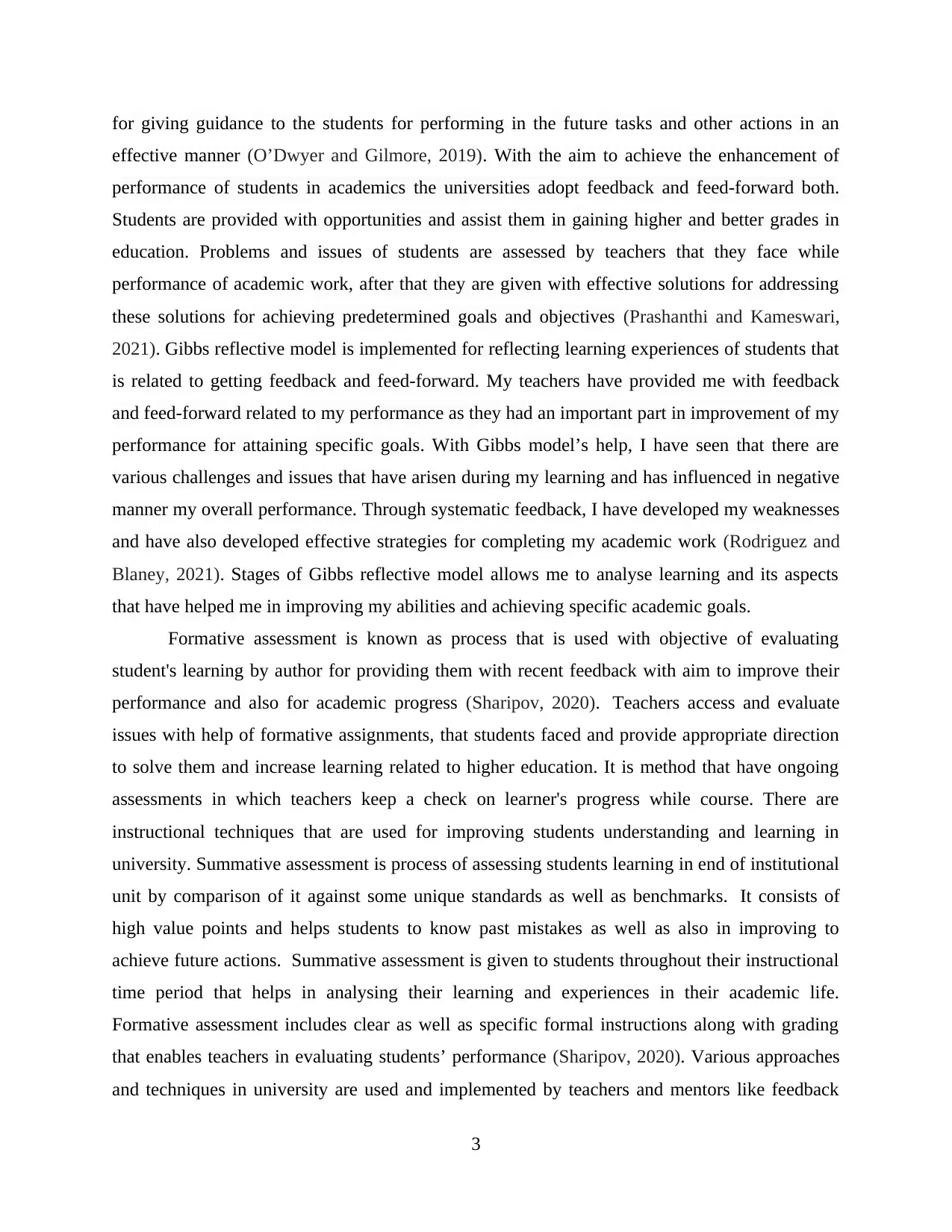
for giving guidance to the students for performing in the future tasks and other actions in an
effective manner (O’Dwyer and Gilmore, 2019). With the aim to achieve the enhancement of
performance of students in academics the universities adopt feedback and feed-forward both.
Students are provided with opportunities and assist them in gaining higher and better grades in
education. Problems and issues of students are assessed by teachers that they face while
performance of academic work, after that they are given with effective solutions for addressing
these solutions for achieving predetermined goals and objectives (Prashanthi and Kameswari,
2021). Gibbs reflective model is implemented for reflecting learning experiences of students that
is related to getting feedback and feed-forward. My teachers have provided me with feedback
and feed-forward related to my performance as they had an important part in improvement of my
performance for attaining specific goals. With Gibbs model’s help, I have seen that there are
various challenges and issues that have arisen during my learning and has influenced in negative
manner my overall performance. Through systematic feedback, I have developed my weaknesses
and have also developed effective strategies for completing my academic work (Rodriguez and
Blaney, 2021). Stages of Gibbs reflective model allows me to analyse learning and its aspects
that have helped me in improving my abilities and achieving specific academic goals.
Formative assessment is known as process that is used with objective of evaluating
student's learning by author for providing them with recent feedback with aim to improve their
performance and also for academic progress (Sharipov, 2020). Teachers access and evaluate
issues with help of formative assignments, that students faced and provide appropriate direction
to solve them and increase learning related to higher education. It is method that have ongoing
assessments in which teachers keep a check on learner's progress while course. There are
instructional techniques that are used for improving students understanding and learning in
university. Summative assessment is process of assessing students learning in end of institutional
unit by comparison of it against some unique standards as well as benchmarks. It consists of
high value points and helps students to know past mistakes as well as also in improving to
achieve future actions. Summative assessment is given to students throughout their instructional
time period that helps in analysing their learning and experiences in their academic life.
Formative assessment includes clear as well as specific formal instructions along with grading
that enables teachers in evaluating students’ performance (Sharipov, 2020). Various approaches
and techniques in university are used and implemented by teachers and mentors like feedback
3
effective manner (O’Dwyer and Gilmore, 2019). With the aim to achieve the enhancement of
performance of students in academics the universities adopt feedback and feed-forward both.
Students are provided with opportunities and assist them in gaining higher and better grades in
education. Problems and issues of students are assessed by teachers that they face while
performance of academic work, after that they are given with effective solutions for addressing
these solutions for achieving predetermined goals and objectives (Prashanthi and Kameswari,
2021). Gibbs reflective model is implemented for reflecting learning experiences of students that
is related to getting feedback and feed-forward. My teachers have provided me with feedback
and feed-forward related to my performance as they had an important part in improvement of my
performance for attaining specific goals. With Gibbs model’s help, I have seen that there are
various challenges and issues that have arisen during my learning and has influenced in negative
manner my overall performance. Through systematic feedback, I have developed my weaknesses
and have also developed effective strategies for completing my academic work (Rodriguez and
Blaney, 2021). Stages of Gibbs reflective model allows me to analyse learning and its aspects
that have helped me in improving my abilities and achieving specific academic goals.
Formative assessment is known as process that is used with objective of evaluating
student's learning by author for providing them with recent feedback with aim to improve their
performance and also for academic progress (Sharipov, 2020). Teachers access and evaluate
issues with help of formative assignments, that students faced and provide appropriate direction
to solve them and increase learning related to higher education. It is method that have ongoing
assessments in which teachers keep a check on learner's progress while course. There are
instructional techniques that are used for improving students understanding and learning in
university. Summative assessment is process of assessing students learning in end of institutional
unit by comparison of it against some unique standards as well as benchmarks. It consists of
high value points and helps students to know past mistakes as well as also in improving to
achieve future actions. Summative assessment is given to students throughout their instructional
time period that helps in analysing their learning and experiences in their academic life.
Formative assessment includes clear as well as specific formal instructions along with grading
that enables teachers in evaluating students’ performance (Sharipov, 2020). Various approaches
and techniques in university are used and implemented by teachers and mentors like feedback
3
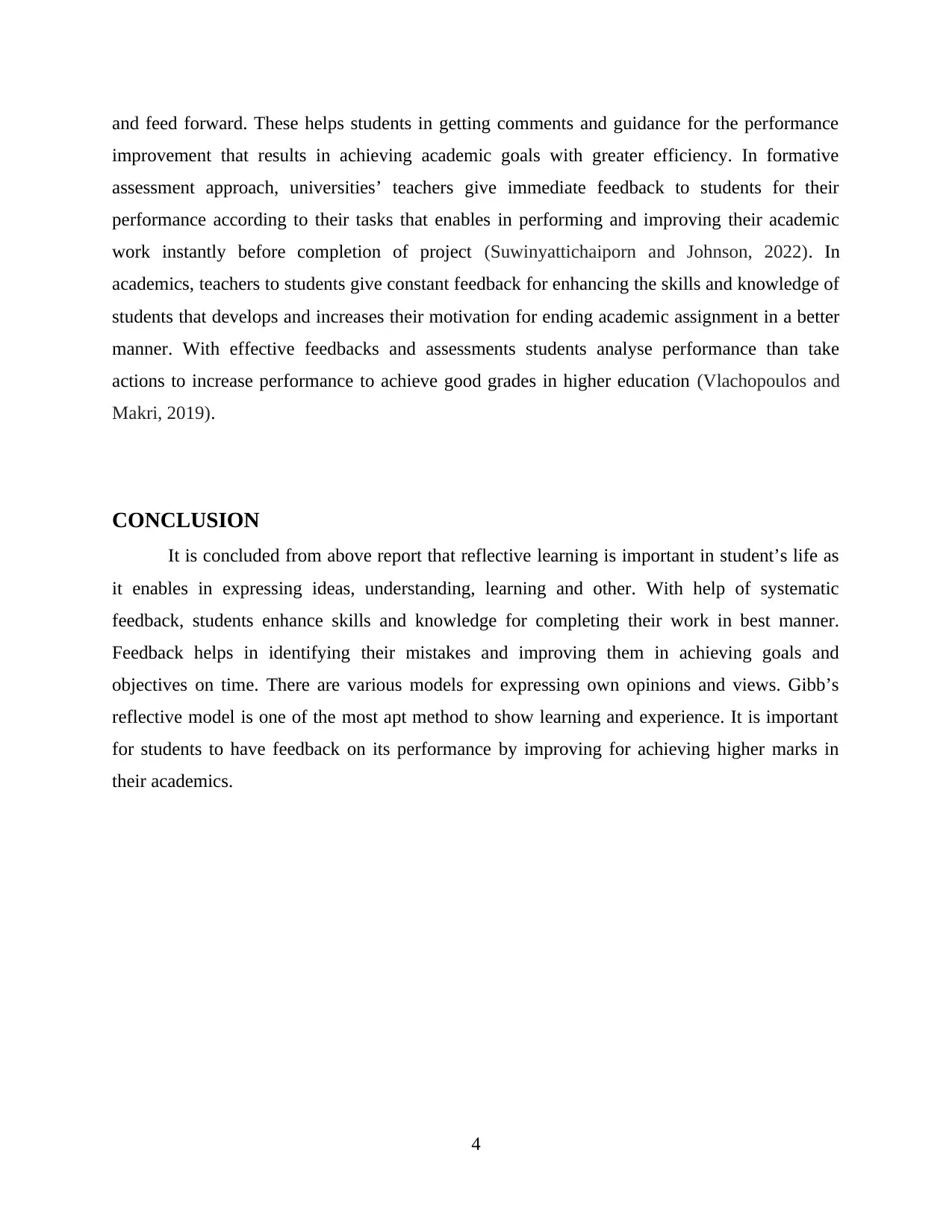
and feed forward. These helps students in getting comments and guidance for the performance
improvement that results in achieving academic goals with greater efficiency. In formative
assessment approach, universities’ teachers give immediate feedback to students for their
performance according to their tasks that enables in performing and improving their academic
work instantly before completion of project (Suwinyattichaiporn and Johnson, 2022). In
academics, teachers to students give constant feedback for enhancing the skills and knowledge of
students that develops and increases their motivation for ending academic assignment in a better
manner. With effective feedbacks and assessments students analyse performance than take
actions to increase performance to achieve good grades in higher education (Vlachopoulos and
Makri, 2019).
CONCLUSION
It is concluded from above report that reflective learning is important in student’s life as
it enables in expressing ideas, understanding, learning and other. With help of systematic
feedback, students enhance skills and knowledge for completing their work in best manner.
Feedback helps in identifying their mistakes and improving them in achieving goals and
objectives on time. There are various models for expressing own opinions and views. Gibb’s
reflective model is one of the most apt method to show learning and experience. It is important
for students to have feedback on its performance by improving for achieving higher marks in
their academics.
4
improvement that results in achieving academic goals with greater efficiency. In formative
assessment approach, universities’ teachers give immediate feedback to students for their
performance according to their tasks that enables in performing and improving their academic
work instantly before completion of project (Suwinyattichaiporn and Johnson, 2022). In
academics, teachers to students give constant feedback for enhancing the skills and knowledge of
students that develops and increases their motivation for ending academic assignment in a better
manner. With effective feedbacks and assessments students analyse performance than take
actions to increase performance to achieve good grades in higher education (Vlachopoulos and
Makri, 2019).
CONCLUSION
It is concluded from above report that reflective learning is important in student’s life as
it enables in expressing ideas, understanding, learning and other. With help of systematic
feedback, students enhance skills and knowledge for completing their work in best manner.
Feedback helps in identifying their mistakes and improving them in achieving goals and
objectives on time. There are various models for expressing own opinions and views. Gibb’s
reflective model is one of the most apt method to show learning and experience. It is important
for students to have feedback on its performance by improving for achieving higher marks in
their academics.
4
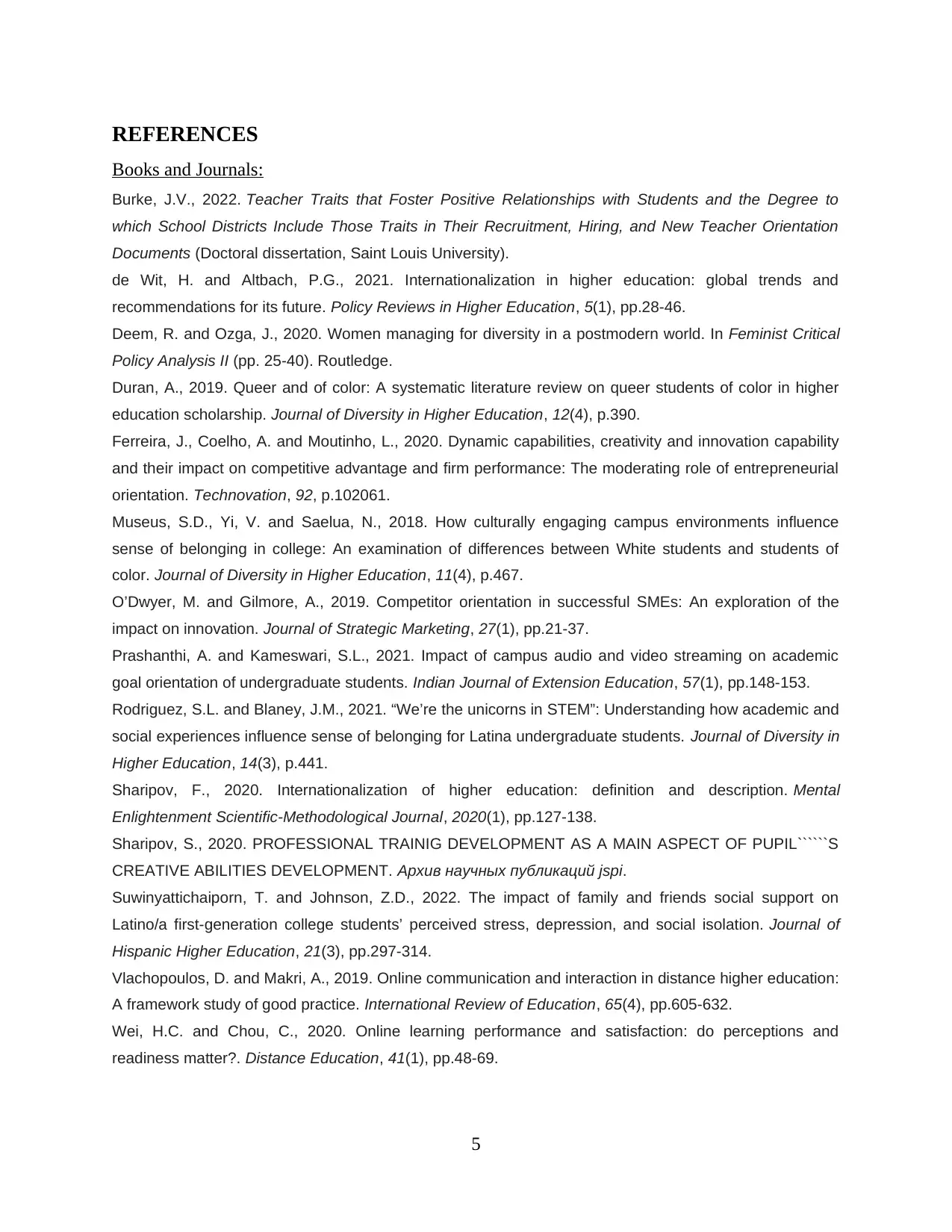
REFERENCES
Books and Journals:
Burke, J.V., 2022. Teacher Traits that Foster Positive Relationships with Students and the Degree to
which School Districts Include Those Traits in Their Recruitment, Hiring, and New Teacher Orientation
Documents (Doctoral dissertation, Saint Louis University).
de Wit, H. and Altbach, P.G., 2021. Internationalization in higher education: global trends and
recommendations for its future. Policy Reviews in Higher Education, 5(1), pp.28-46.
Deem, R. and Ozga, J., 2020. Women managing for diversity in a postmodern world. In Feminist Critical
Policy Analysis II (pp. 25-40). Routledge.
Duran, A., 2019. Queer and of color: A systematic literature review on queer students of color in higher
education scholarship. Journal of Diversity in Higher Education, 12(4), p.390.
Ferreira, J., Coelho, A. and Moutinho, L., 2020. Dynamic capabilities, creativity and innovation capability
and their impact on competitive advantage and firm performance: The moderating role of entrepreneurial
orientation. Technovation, 92, p.102061.
Museus, S.D., Yi, V. and Saelua, N., 2018. How culturally engaging campus environments influence
sense of belonging in college: An examination of differences between White students and students of
color. Journal of Diversity in Higher Education, 11(4), p.467.
O’Dwyer, M. and Gilmore, A., 2019. Competitor orientation in successful SMEs: An exploration of the
impact on innovation. Journal of Strategic Marketing, 27(1), pp.21-37.
Prashanthi, A. and Kameswari, S.L., 2021. Impact of campus audio and video streaming on academic
goal orientation of undergraduate students. Indian Journal of Extension Education, 57(1), pp.148-153.
Rodriguez, S.L. and Blaney, J.M., 2021. “We’re the unicorns in STEM”: Understanding how academic and
social experiences influence sense of belonging for Latina undergraduate students. Journal of Diversity in
Higher Education, 14(3), p.441.
Sharipov, F., 2020. Internationalization of higher education: definition and description. Mental
Enlightenment Scientific-Methodological Journal, 2020(1), pp.127-138.
Sharipov, S., 2020. PROFESSIONAL TRAINIG DEVELOPMENT AS A MAIN ASPECT OF PUPIL``````S
CREATIVE ABILITIES DEVELOPMENT. Архив научных публикаций jspi.
Suwinyattichaiporn, T. and Johnson, Z.D., 2022. The impact of family and friends social support on
Latino/a first-generation college students’ perceived stress, depression, and social isolation. Journal of
Hispanic Higher Education, 21(3), pp.297-314.
Vlachopoulos, D. and Makri, A., 2019. Online communication and interaction in distance higher education:
A framework study of good practice. International Review of Education, 65(4), pp.605-632.
Wei, H.C. and Chou, C., 2020. Online learning performance and satisfaction: do perceptions and
readiness matter?. Distance Education, 41(1), pp.48-69.
5
Books and Journals:
Burke, J.V., 2022. Teacher Traits that Foster Positive Relationships with Students and the Degree to
which School Districts Include Those Traits in Their Recruitment, Hiring, and New Teacher Orientation
Documents (Doctoral dissertation, Saint Louis University).
de Wit, H. and Altbach, P.G., 2021. Internationalization in higher education: global trends and
recommendations for its future. Policy Reviews in Higher Education, 5(1), pp.28-46.
Deem, R. and Ozga, J., 2020. Women managing for diversity in a postmodern world. In Feminist Critical
Policy Analysis II (pp. 25-40). Routledge.
Duran, A., 2019. Queer and of color: A systematic literature review on queer students of color in higher
education scholarship. Journal of Diversity in Higher Education, 12(4), p.390.
Ferreira, J., Coelho, A. and Moutinho, L., 2020. Dynamic capabilities, creativity and innovation capability
and their impact on competitive advantage and firm performance: The moderating role of entrepreneurial
orientation. Technovation, 92, p.102061.
Museus, S.D., Yi, V. and Saelua, N., 2018. How culturally engaging campus environments influence
sense of belonging in college: An examination of differences between White students and students of
color. Journal of Diversity in Higher Education, 11(4), p.467.
O’Dwyer, M. and Gilmore, A., 2019. Competitor orientation in successful SMEs: An exploration of the
impact on innovation. Journal of Strategic Marketing, 27(1), pp.21-37.
Prashanthi, A. and Kameswari, S.L., 2021. Impact of campus audio and video streaming on academic
goal orientation of undergraduate students. Indian Journal of Extension Education, 57(1), pp.148-153.
Rodriguez, S.L. and Blaney, J.M., 2021. “We’re the unicorns in STEM”: Understanding how academic and
social experiences influence sense of belonging for Latina undergraduate students. Journal of Diversity in
Higher Education, 14(3), p.441.
Sharipov, F., 2020. Internationalization of higher education: definition and description. Mental
Enlightenment Scientific-Methodological Journal, 2020(1), pp.127-138.
Sharipov, S., 2020. PROFESSIONAL TRAINIG DEVELOPMENT AS A MAIN ASPECT OF PUPIL``````S
CREATIVE ABILITIES DEVELOPMENT. Архив научных публикаций jspi.
Suwinyattichaiporn, T. and Johnson, Z.D., 2022. The impact of family and friends social support on
Latino/a first-generation college students’ perceived stress, depression, and social isolation. Journal of
Hispanic Higher Education, 21(3), pp.297-314.
Vlachopoulos, D. and Makri, A., 2019. Online communication and interaction in distance higher education:
A framework study of good practice. International Review of Education, 65(4), pp.605-632.
Wei, H.C. and Chou, C., 2020. Online learning performance and satisfaction: do perceptions and
readiness matter?. Distance Education, 41(1), pp.48-69.
5
Paraphrase This Document
Need a fresh take? Get an instant paraphrase of this document with our AI Paraphraser
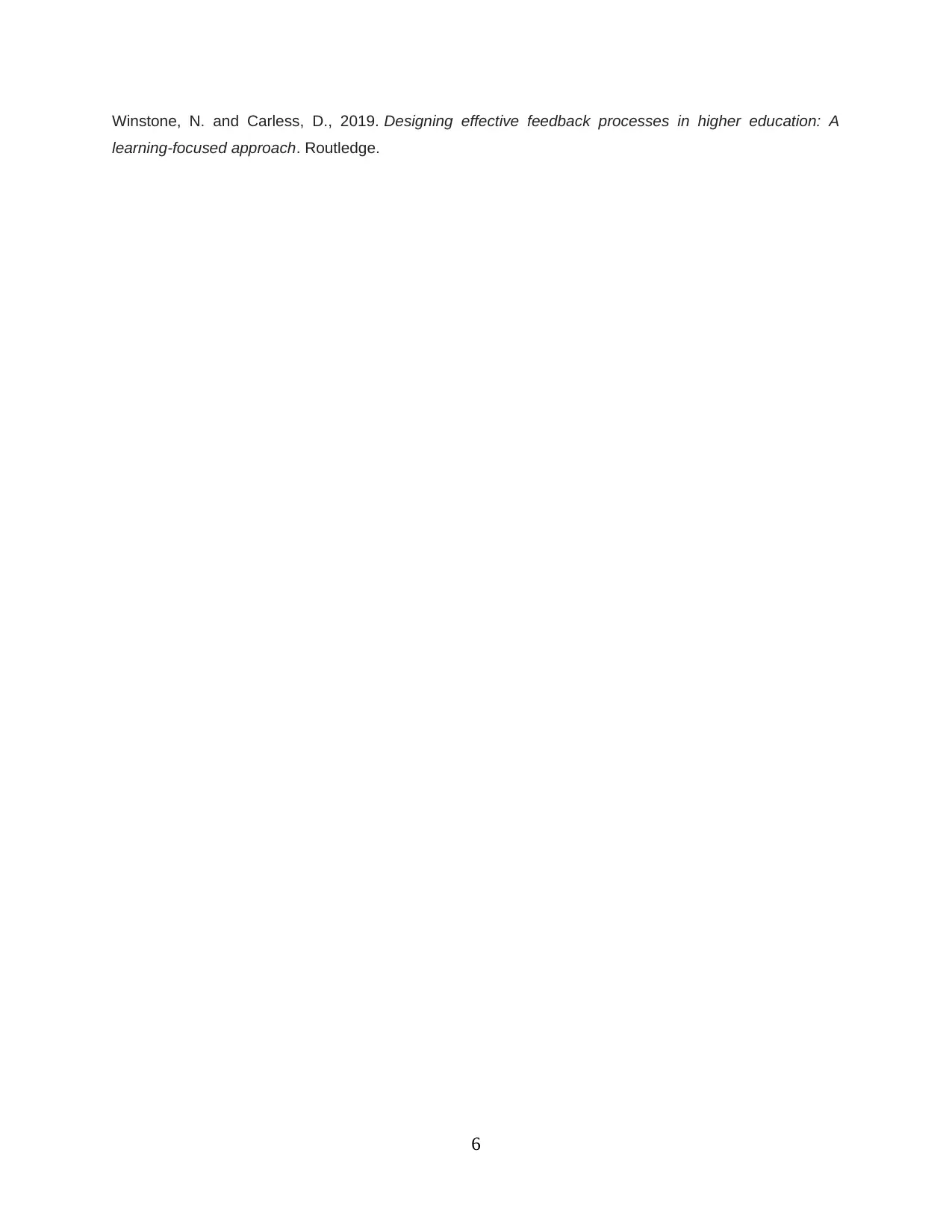
Winstone, N. and Carless, D., 2019. Designing effective feedback processes in higher education: A
learning-focused approach. Routledge.
6
learning-focused approach. Routledge.
6
1 out of 8
Related Documents
Your All-in-One AI-Powered Toolkit for Academic Success.
+13062052269
info@desklib.com
Available 24*7 on WhatsApp / Email
![[object Object]](/_next/static/media/star-bottom.7253800d.svg)
Unlock your academic potential
© 2024 | Zucol Services PVT LTD | All rights reserved.
